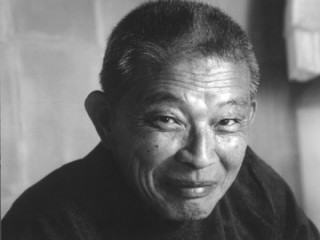
Mako (actor) biography
Date of birth : 1933-12-10
Date of death : 2006-07-21
Birthplace : Kobe, Japan
Nationality : Japanese
Category : Arts and Entertainment
Last modified : 2011-09-09
Credited as : actor, M*A*S*H, Seven Years in Tibet
2 votes so far
Mako in the Japanese city of Kobe in 1933. His parents went to the United States to study art in New York City while he stayed behind with his grandparents. America's entry into World War II came when he was seven years old, when Japanese planes bombed a U.S. naval base at Pearl Harbor, Hawaii, in December of 1941, and with the two countries officially at war Mako was unable to join his parents for several more years. Finally, at the age of 15 he was reunited with them in New York City.
As a young man, Mako planned to become an architect, and enrolled at the Pratt Institute of New York City. When a fellow student asked him to help design a set for a play, he found himself drawn to theater and immersed himself in it to the point where his architecture studies suffered, and he lost his student draft deferment. He spent two years in the U.S. Army, and upon returning to civilian life settled in California and began studying drama at the renowned Pasadena Playhouse. As an Asian American, however, he was usually cast in stock characters in the first film and television jobs he landed. His most prominent work was in the popular television sitcom McHale's Navy in the early 1960s, in which he played various Japanese soldier or officer parts in the World War II-set series.
Mako's breakout part came in The Sand Pebbles , a 1966 movie that starred Steve McQueen as an engineer on an American gunboat stationed in China during the 1920s. Mako was cast as Po-han, an engine-room worker on board the ship, and though his character was deferential to McQueen's character and the other sailors, "most reviewers hailed the performance, saying it transcended the role's stereotypical confines," noted the New York Times ' Margalit Fox. One pivotal scene involved a fistfight in which Po-han triumphs over his much larger American opponent, and it helped him earn a nomination for an Academy Award as Best Supporting Actor.
Reacting to the dearth of solid roles for Asian-heritage thespians, Mako co-founded the East West Players in 1965, the first Asian-American theater company. He served as its artistic director until 1989, and continued to work in Hollywood, amassing more than 140 screen and television credits over his long career. Some of his best-known roles came in the hit television series M*A*S*H in the 1970s, and as Akiro the wizard in the Conan the Barbarian movies of the 1980s that starred Arnold Schwarzenegger. Broadway audiences saw him in Pacific Overtures , the 1976 musical from Stephen Sondheim that retold the story of the establishment of diplomatic and trade ties between the United States and Japan in the 1850s. He was the play's Reciter, or narrator, but also appeared in other parts and was nominated for a Tony Award as Best Actor in a Musical for it.
Other roles for Mako included the 1997 Brad Pitt movie Seven Years in Tibet , 2001's Pearl Harbor , and Memoirs of a Geisha in 2005. He also served as the voice of Uncle Iroh in Avatar: The Last Airbender , the animated series from Nickelodeon. He died at the age of 72 from esophageal cancer on July 21, 2006, at his home in Somis, California. Survivors include his wife, Shizuko Hoshi, a dancer, choreographer and actress, and their two daughters, Sala and Mimosa. His East West Players company had become a respected training ground for scores of Asian-American performers. "We've been fighting against stereotypes from Day One at East West," he told the Los Angeles Times in 1986, according to his obituary writer, Jocelyn Y. Stewart. "That's the reason we formed: to combat that, and to show we are capable of more than just fulfilling the stereotypes waiter, laundryman, gardener, martial artist, villain."
















